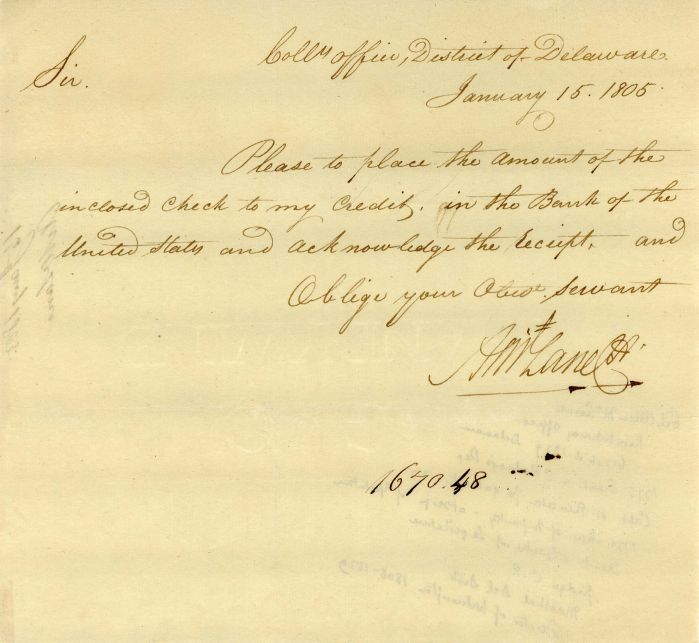Note signed by Allen McLane
Inv# AU1363
Note regarding the deposit of a check into the Bank of the United States signed by Allen McLane.

Allan McLane (August 8, 1746 – May 22, 1829) was an officer in the Continental Army during the American Revolutionary War. He was appointed as the first United States Marshal of Delaware in 1789, and as Customs Collector of the Port of Wilmington in 1797. McLane served in the Continental Army during the Revolutionary War. In 1775, he was a volunteer in the Battle of Great Bridge near Norfolk, Virginia, where the Virginia militia repelled a British assault. He was one of the first American officers to suspect Benedict Arnold's loyalty. He joined Caesar Rodney's Delaware regiment as a lieutenant, and fought at the battles of Long Island, White Plains, Princeton, and Monmouth. He used most of the fortune he inherited after his father died to fund his own company, providing payment and equipment for the troops. During the Philadelphia campaign, according to historian Christopher Ward: He was Captain of an independent corps, now a small group of horsemen, now a hundred men, mounted and on foot, including sometimes a contingent of Oneida Indians, he was at once forager, scout, and raider everywhere about Philadelphia and even, at times, in that city in disguise. In December 1777, in personal combat with three British dragoons near Philadelphia, Captain McLane killed one, wounded another, and compelled the third to flee. The encounter became the subject of a painting by James Peale. During the Continental Army's encampment at Valley Forge in 1778, McLane led foraging parties. He and his men cut off British expeditions and took their cattle. In July 1779, McLane and his company were annexed to Lee's Legion, with McLane to command the infantry. McLane served under the command of Major "Light-Horse Harry" Lee at the Battles of Stony Point and Paulus Hook, but tensions between McLane and Lee ultimately caused Washington to send McLane and his company to Charleston, South Carolina to reinforce General Benjamin Lincoln. After the British captured Charleston in March 1780, McLane came under the command of Baron von Steuben, who was then assisting General Nathanael Greene in the Southern campaign. He returned north, and was breveted to the rank of major in 1781. In June 1781, McLane took ship on the American privateer Congress to carry dispatches from George Washington to Count Paul de Grasse, who was at Cap-François, Haiti, commanding a French fleet. After convincing de Grasse to bring his fleet to Chesapeake Bay, McLane returned to New Jersey in September 1781. Along the way, he commanded the Congress's Marines during the capture of HMS Savage, a British sloop-of-war. McLane continued to serve through the Yorktown campaign, scouting the movement of British troops southward from New York City, and capturing British private naval signals. He left the army at the end of 1781.











Ebay ID: labarre_galleries